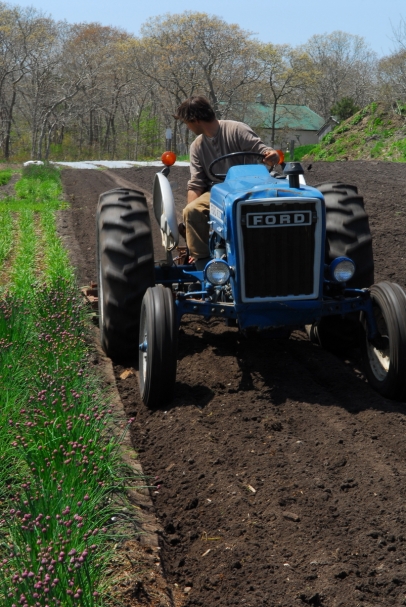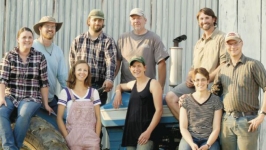Homegrown by Heroes: USDA Builds Bridges for Veterans to Continue Farming
Each summer American flags adorn paper plates filled with local sweet corn, watermelons, and hamburgers. Summertime memories are packed with Memorial Day cookouts and 4th of July festivals. These get-togethers with family and friends celebrate the freedom we Americans so cherish, and honor those patriots who sacrificed to defend it. In past, we saluted our veterans in the community with parades, now the United States Department of Agriculture (USDA) looks to salute those veterans growing your summertime favorites.
Rural America has a long history of serving our country in both agriculture and defense. While only 17% of the population live in rural America, more than 44% of military recruits are from rural communities. Both urban and rural veterans returning from service often find solace in the quiet and the tranquil countryside. For some, farming is the perfect transition when they return home.
In the past, when veterans went to Veteran Affairs (VA) for Vocational Rehabilitation and Employment services there were no programs in agriculture. Since the end of World War II, veteran services centered in urban communities with services and opportunities encouraging the migration of veterans to cities. It all changed, in 2008, when a group of veterans formed the Farmer Veterans Coalition (FVC) and showcased to both the VA and the USDA how careers in food and agriculture are often a perfect bridge for them.
In 2014 the Farm Bill included historic language, defining a veteran farmer as a farmer who has served in the Armed Forces and not operated a farm for more than 10 years. This distinct classification allows for veterans to receive federal assistance from the USDA that includes conservation programs, direct operating loans, and allocates $9 million annually in competitive grants to organizations providing training, education, outreach, and technical assistance to veteran farmers.
One of the most creative veteran farmer programs includes the Transition Incentive Program (TIP). The TIP allows retiring farmers with land in The Conservation Reserve Program to sell or lease to veteran farmers and be eligible for additional payments. This ensures land transitioning out of CRP is made available to new farmers while ensuring it is farmed or grazed in a sustainable manner.
“USDA has stepped up and is eager to partner with the VA by supporting veterans transitioning to farming” says Marine Corps Captain Guy Zierk. Guy is with the Wounded Warrior Regiment and stationed in Central Ohio. His mission is to help disabled veterans transition into civilian life. He sees the USDA’s work as win-win for both veterans and rural America. “Military members are extensively trained in operational planning for every part of a mission. These skills directly transfer to farming and are a critical element in creating a profitable farm business in rural Ohio.”
Rick Barnett is an Army veteran currently working on my brother’s farm, Bird’s Haven. “This is the first job I have had since leaving the military in 1995 where I have yet to wake up and not want to go to work.”
Rick has had several different careers since serving in Somalia and Haiti. He began working in agriculture two years ago.
“It simply utilizes every aspect of my military training and uses it for good. We were trained in planning, construction, engineering, and overcoming weather conditions. Often we were required to use whatever tools were available to get the job done—something that is required on a daily basis in farming.” Rick then laughs, “Smelly boots are also just a central part of life in both jobs.”
Rick believes USDA’s programs to assist veterans begin faming are complimentary to services already provided by the VA. While most self-employed farmers struggle with health insurance, veterans are eligible for VA health insurance. Many veterans may receive monthly retirement or disability payments from the VA. These added incomes offset the limited profitability of starting a farm.
“For me working outdoors, doing something different every day, doing nothing but creating life and doing good for the world has been healing and purposeful,” says Rick.
In addition to these programs, the USDA is currently committed to four main goals for veteran farmers. The “Homegrown by Heroes” label, the creation of a veteran farmer app, a 25% increase in veteran hires within the USDA, and ensuring all county extension officers are educated on how to support transitioning military members.
Support farmer veterans, like Rick, through the Farmer Veteran Coalition. Visit farmvetco.org to share this program with a veteran you know.
Ohio boasts of the following farms that are Homegrown by Heroes members, an innovative veteran farmer program that "mobilizes veterans to feed America."
Dandelion Lane Farm in Leetonia, Ohio
Dandelion Lane Farm is an 11-acre farm in Columbiana County in Northeast Ohio. Air Force veteran Lee Lichtenwalner and his wife, Dawn grow a variety of herbs and vegetables, specializing in heirloom products. They’re also working on a line of value-added products using Ohio produce and berries. Lee works full-time on the farm, devoting his attention and experience to his passion for farming.
Schneider’s Hop Haus, LLC in Aurora, Ohio
A family farm specializing in the growth of hops and lavender located in Aurora, Ohio right on the fringe of the Chagrin Valley. Organic crops raised with sustainable methods.
Find-A-Way Farm in Langsville, Ohio
Beth and Brian Duffy farm where Beth’s parents were both raised, an 80-acre older homestead in Meigs County Ohio, near the small college town of Athens, Ohio. The farm began with a “flock of four” and has now grown to thirty healthy sheep that produce delicious grass-fed lamb. Additionally, Find-A-Way Farm has free-range stewing hens and eggs. Brian is currently working on a plan to add broiler chickens and grass-fed beef to the farm.
Dickie Bird Farm, LLC in Chillicothe, Ohio
“Dickie Bird Farm, LLC is a convergent effort of a displaced Yankee and a wandering Texas cowboy,” reads their website. Raising free-range chickens, heritage breed turkeys, goats, and honeybees, Dickie Bird Farm grows heirloom vegetables, fresh fruit and nuts. The breeds that call Dickie Bird Farm Home include Buff Orpington, Silver Laced Wyandotte, Welsummer and Black Australorp chickens and Blue Slate, Bronze Standards, Red Bourbon, and White Broad Breasted turkeys.
Wood Family Farm in Kenton, Ohio
Wood Family Farm in Kenton, Ohio is a partnership between four veterans: Shane (Army/OIF) and Victoria (Army/OEF), here with their children, Shane’s Grandfather Robert (Korea), and Great-Uncle James (WWII).
Starting in 2002, Shane served in Germany and Kosovo before his tour of duty in Iraq, where he was injured by an improvised explosive device. After nine surgeries, he returned to fight in Fallujah before coming back to his hometown of Kenton in 2005. But through all of this, he maintained a desire to return to the 70-acre farm owned by his grandfather, a Korean War veteran. Having time to be alone and care for his animals has helped him deal with the stress he experienced during his service.
Bush Valley Farm in Adamsville, Ohio
Bush Valley Farm is owned and operated by Scott and Jean Bush, who are both retired from the U.S. military. Bush Valley Farm provides quality, farm‐raised pork, sheep, and poultry that can be custom ordered to any specification. Bush Valley Farm animals are raised in open pastures and forests in as natural and healthy an environment as possible. The animals happily spend their days grazing Ohio-sweet pastures.
Other participating farms include Arrow Creek Farm in Mechanicsburg, Ohio run by Dale Thompson and a retired nursery known as Friebel's Greenhouse in Shelby, Ohio. Visit farmvetco.org to share this program with a veteran you know.






